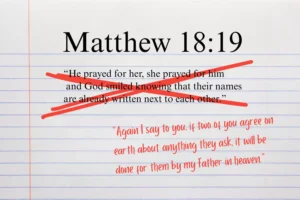I sat in my office sulking. My day had been so demanding. My week tiresome. My month an all out marathon, minus the fans.
Pastoring eternal souls, preaching week after week, leading leaders, and being on mission is demanding enough, but occasionally the demands pile higher. As a pastor, I am a sinner that counsels sinners. This means that, despite our common hope in the Gospel, there are times that I fail to apply my own Gospel counsel to my own soul.
The past couple of weeks had been one of those “pile up” weeks. More counseling, more speaking, more demands. Add to that pile a particular situation that was, shall we say, extreme? I received hate mail, church slander, and watched self-destructive behavior dismantle a soul, one that I had poured a lot of life into.
My circumstances had been challenging to say the least. No one understands what it’s like to be a pastor, I thought to myself. I deserve better treatment, better circumstances. This is so emotionally draining!
In my sulking and suffering, I turned to Chuck Palahniuk for some help, author of Choke, Snuff and Fight Club.
Are You in the Spiritual War?
Chuck Palahniuk writes sketchy fiction that challenge the prevailing norms for identity in our culture. His book Fight Club exposes misplaced identity through the central characters: The Narrator (played by Edward Norton in the movie version) and Tyler Durden (played by Brad Pitt). Durden starts underground fighting clubs where men show up after hours to fight bare-chested and barefoot.
In the now famous scene from Fight Club, the movie, Durden gives a speech that clarifies just what kind of war we should be fighting:
We are the middle children of history, man. No purpose or place. We have no great war, or great depression. Our great war is a spiritual war. Our great depression is our lives. We’ve all been raised by television to believe that one day we’ll all be millionaires and movie gods and rock stars — but we won’t.
Our great war is a spiritual war.
But what kind of spiritual war? Chuck points to the opponent of deception, to a war against believing a set of lies that, when believed, distort our identity — that we will all become millionaires, movie gods or rock stars. We won’t.
The spiritual war, according to Chuck, is to ground your identity in reality, not in the American Dream. This is precisely what Edward Norton struggles to do. He wants to be sexier and cooler than he actually is. He wants to be Brad Pitt, and he wants it so badly that he creates an alter ego called Tyler Durden, who starts Fight Clubs and lives like a rock god. He believes the lie that ubermasculinity and rock-star living will give his life meaning, a greater sense of identity. So he creates Tyler Durden in his mind. You might say he has “identity issues,” but he’s not the only one.
We All Have Identity Issues
Many of us have created an alter ego. It’s more subtle than Norton’s, but it’s an alter ego nonetheless.
This alter ego contends for our identity. It pulls at your heart, your longings. It tells you that if you were just a little more like this or that, then you’d be somebody. If you were better looking, if you were more successful, if you were married, if you were more spiritual, if you had more of a following on Twitter or Facebook, then you’d be somebody.
How do you detect your alter ego? Where do your thoughts drift when you have down time? What do you daydream about? Follow your thoughts, your dreams, your heart-longings, and you will find your alter ego — the thing or things that call for you to find security/identity in them. In an interview with Paste Magazine, Chuck Palahniuk shares where part of his vision for Fight Club came from. He notes that the fighting in Fight Club was more about:
… people need(ing) a consensual forum in which to express themselves and to exhaust their pent up anxiety, and also to test themselves and kind of destroy their identity-of-the-moment, so that they can move on to a better, stronger identity …
So, for Chuck, Fight Club really is about identity — destroying the unwanted identity-of-the-moment (alter ego) and finding a better identity. This is what’s at stake in our fighting. A better identity.
Growing in Gospel Identity
In order to cultivate Gospel Identity, it is critical that we consistently see through our sin to our “identity-of-the-moment,” put that false identity to death, and turn to Christ for life and joy. Here are a few steps I try to follow to fight for true joy in Christ when temptation and suffering hit.
1. Know Your Identity-of-the-Moment. I look for the sinful patterns in my life and trace them to “identity-of-the-moment.” For instance, my sin was sulking, and my false identity was victim. I ask myself the hard questions. “What are you longing for most right now?” “Why are your emotions so extreme?” Check out David Powlison’s helpful “X-ray Questions” for a more extensive list of questions to help see through sin to our misplaced sense of identity. To summarize:
- Identify sinful patterns
- Trace patterns to your “identity-of-the-moment”
2. Fight Your Alter Ego. Once I detect my sin/identity issue, I try to fight it. First, I confess my sin to God and ask for His forgiveness for my God-belittling desires and decisions (1 John 1:9). Then, I follow my confession to God with confession to community so that I can experience healing and encouragement of the church (James 5:16). Second, I seek encouragement from others to take sin seriously, to “put sin to death” (Romans 8:13; Colossians 3:5). I need community to keep identity-twisting sin from just rolling off my back. We’ve got to get tenacious about glorifying and enjoying God. To summarize:
- Confess your sin (to God and one another)
- Get serious about fighting for true joy
3. Trust Your Savior. Trusting our Savior for Gospel identity instead of an identity-of-the-moment is the most difficult and important part of being a disciple.
Robert Murray McCheyene said: “For every look at sin, look ten times at Christ.” How does Christ offer you a better identity than the false identity? My sin was sulking, and my identity was victim. Second Peter 1:3 reminds me that my identity is godly, a partaker of the divine nature. I was sulking in ungodliness because I thought I deserved better circumstances. I felt weak. This time I turned Peter the Apostle, not Chuck Palahniuk.
Peter reminded me that we have “divine power granted to us for life and godliness.” This Scripture reminded me of my identity — godly — but it does not stop there. It also offers a Savior to trust, a counter-promise of divine power necessary to live a godly life, not a sulking life. What a relief! Our identity is godly, and our promise is divine power! To summarize:
- Find your Gospel counter-Identity
- Trust your Biblical promise
Cultivating Identity in Community
Interestingly, some of the material for Palahniuk’s book came from his experience in hospice patient therapy. During one Christmas, he picked a paper ornament off a church Christmas tree, the kind that obligates you to a good deed, like buying a gift for an underprivileged child. His ornament called him to give hospice patients a ride to their therapy sessions. As he sat through some of these sessions he reported that:
I started to recognize that, in a way, 12-step groups, recovery groups, support groups were becoming the new kind of church of our time — a place where people will go and confess their very worst aspects of their lives and seek redemption and community with other people in the way that people used to go to church and sort of present their worst selves in confession and then celebrate communion and then go home for another week.
This is what got Chuck going with some of Fight Clubs — the need for redemption and community. It’s time the church took those things back. It’s time we became a community that does confess the worst part of our lives to one another, but we don’t stop there.
But that’s about as far as Chuck Palahniuk can get us. He’s helpful in exposing our identity issues, and even our deeper longings for community and redemption, but his help stops there. See, we need more than confession, more than identity-of-the-moment exposure. We need redemption.
We need people who will point us to the redemption that is in Jesus. People that won’t let us sulk for too long; people who will remind us that our identity isn’t victim. It is son or daughter of the Living God, “partakers of the divine nature,” godly ones.
At my church, we’ve attempted to take back the responsibility of community and redemption through our ‘Fight Clubs’. Fight Clubs are small groups of two to three men or women who gather together to Know their sin, Fight their sin, and Trust their Savior. They are a place to cultivate true Gospel identity in the face of the identity-of-the-moment.
We outlined these basic principles in Fight Clubs: Gospel-centered Discipleship, a community-based, Gospel-centered approach to following Jesus. Find some friends who will help you 1) Know your sin 2) Fight your sin 3) Trust your Savior.
Cultivate a community that will show you your sin, but point you 10 more times to Jesus.
Copyright 2010 Jonathan Dodson. All rights reserved.











